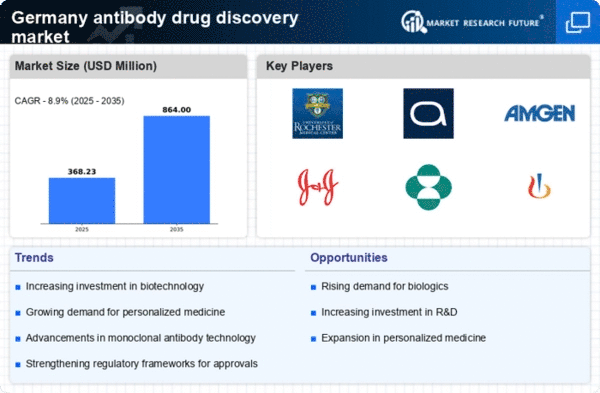Increased Focus on Immunotherapy
The antibody drug-discovery market is witnessing an increased focus on immunotherapy, particularly in Germany. This shift is largely attributed to the growing recognition of the immune system's potential in combating various diseases, including cancer. As of 2025, the immunotherapy segment is projected to account for over 40% of the total antibody drug-discovery market, indicating a substantial shift in therapeutic strategies. The success of existing immunotherapeutic agents has spurred further research and development in this area, leading to the exploration of novel antibody formats and combination therapies. Consequently, the heightened focus on immunotherapy is a critical driver for the antibody drug-discovery market, as it opens new avenues for innovative treatment options.
Supportive Government Initiatives
In Germany, supportive government initiatives play a crucial role in propelling the antibody drug-discovery market. The German government has implemented various funding programs aimed at fostering innovation in biopharmaceutical research. For instance, the Federal Ministry of Education and Research (BMBF) allocates substantial financial resources to support research projects focused on antibody development. In 2025, it is estimated that government funding for biopharmaceutical research will exceed €500 million, which is likely to stimulate advancements in the antibody drug-discovery market. These initiatives not only enhance research capabilities but also facilitate collaborations between academic institutions and industry players, thereby accelerating the development of new antibody therapies.
Growing Demand for Targeted Therapies
The antibody drug-discovery market in Germany is experiencing a notable surge in demand for targeted therapies. This trend is driven by the increasing prevalence of chronic diseases, such as cancer and autoimmune disorders, which require more precise treatment options. In 2025, the market is projected to reach approximately €3 billion, reflecting a compound annual growth rate (CAGR) of around 8%. The focus on personalized medicine is prompting pharmaceutical companies to invest heavily in antibody-based therapies, as these treatments offer improved efficacy and reduced side effects compared to traditional therapies. Consequently, the growing demand for targeted therapies is a significant driver for the antibody drug-discovery market, as it encourages innovation and the development of novel therapeutic agents.
Rising Collaborations and Partnerships
Collaborations and partnerships among pharmaceutical companies, research institutions, and biotechnology firms are becoming increasingly prevalent in the antibody drug-discovery market in Germany. These strategic alliances facilitate knowledge sharing, resource pooling, and risk mitigation, which are essential for the successful development of novel antibody therapies. In 2025, it is anticipated that the number of collaborations in the biopharmaceutical sector will increase by 15%, reflecting a growing trend towards cooperative research efforts. Such partnerships not only enhance the research capabilities of involved entities but also expedite the translation of scientific discoveries into viable therapeutic products. Therefore, the rise in collaborations and partnerships serves as a significant driver for the antibody drug-discovery market.
Advancements in Biomanufacturing Technologies
The antibody drug-discovery market in Germany is significantly influenced by advancements in biomanufacturing technologies. Innovations in production processes, such as the use of single-use bioreactors and continuous manufacturing techniques, are enhancing the efficiency and scalability of antibody production. As of 2025, the market for biomanufacturing technologies is expected to grow by approximately 10%, driven by the need for cost-effective and high-quality antibody production. These advancements enable companies to meet the increasing demand for therapeutic antibodies while reducing production costs. Consequently, the evolution of biomanufacturing technologies is a vital driver for the antibody drug-discovery market, as it supports the rapid development and commercialization of new antibody-based therapies.
















